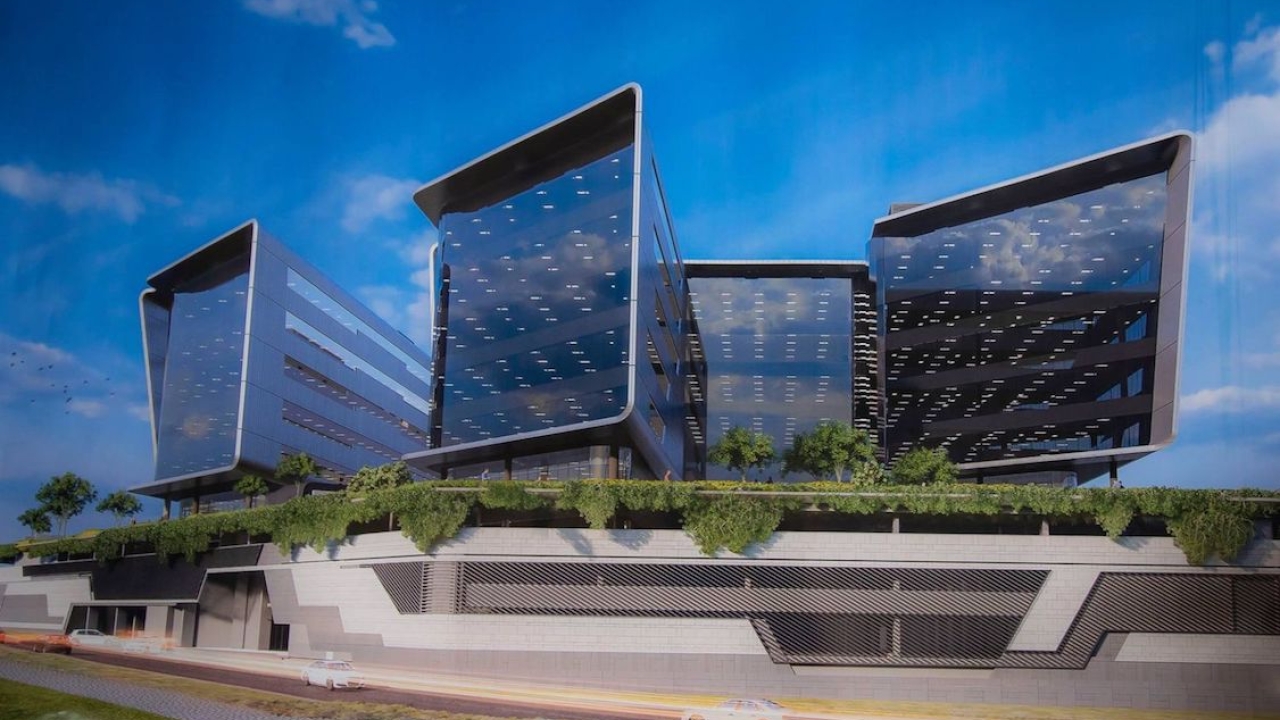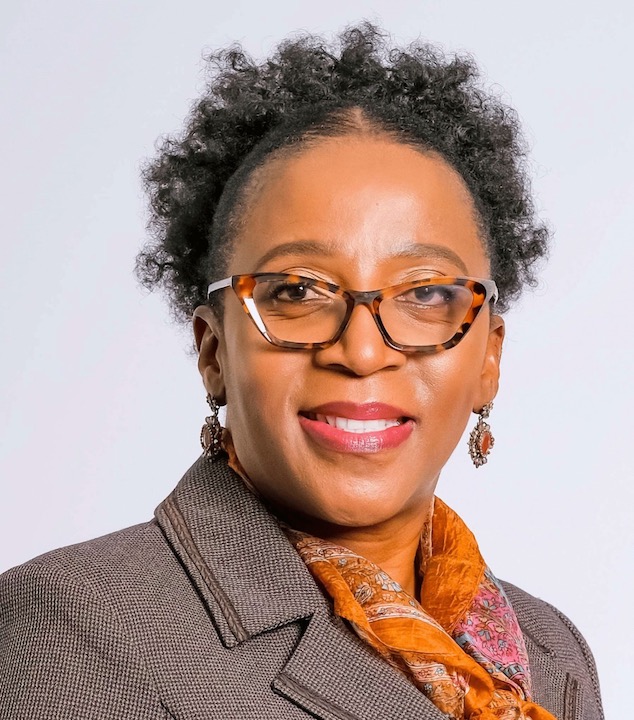Mpofu's balancing act
Ms Mpumi Mpofu has occupied the hot seat as chief executive of ACSA, the Airports Company of South Africa, for a tumultuous past four years.

The new ACSA head office at OR Tambo is short of tenants as the SACAA pulled out during Covid-19. Image: ACSA
Mpofu has a post-graduate degree in town planning from Coventry University and brings extensive experience to her role as head of ACSA, from more than 25 years senior management in transport, local government and infrastructure development.
Mpofu’s first key exposure to airport management was in 2010, the year South Africa hosted the FIFA Soccer World Cup, for which Mpofu headed up ACSA’s development and redevelopment programme. She has also been instrumental in the development of South Africa’s Airlift Strategy which aims to apply a holistic approach to global aviation in support of improved South African air connectivity.
Mpofu accepted the challenge of being CEO of ACSA at the height of the Covid-19 pandemic. A key objective has been to rebuild ACSA’s balance sheet and income statement. Under her leadership, ACSA reported an improvement in earnings to R2-billion for the financial year ended March 31, 2023, from R342-million in the 2022 financial year. Revenue of R6-billion for 2023 was up by 55 per cent compared with R3.9-billion posted for the prior financial year. As a key performance indicator of her management, ACSA has tightly controlled operating expenditure, which only increased by 10 per cent to R3.5-billion.
However, the company is not out of the woods yet, as it reported a loss for both 2022 and 2023. Mpofu said: “Our profitability has been impacted by high credit losses on trade receivables and fair value losses on investment properties, resulting in a 2023 after-tax loss of R142-million, which is a significant improvement on the R1-billion loss of the previous year. The results reflect the group’s steady trajectory towards recovery and a move closer to profitability, following the turbulent trading conditions brought on by the Covid-19 pandemic.”
Mpofu is confident ACSA will return to profits for 2024, thanks to the company’s recover and sustain strategy, as well as the implementation of a revised financial plan. She says that, to ensure this profitability, ACSA is focusing on operational efficiency, by making full use of its R30-billion asset base, plus its diversified revenue streams, and by growing the business through new commercial initiatives. She says that all ACSA facilities that were mothballed during Covid-19 have now been brought back to full operations.
As a monopoly, ACSA aeronautical pricing is determined from a series of ‘permissions’ negotiated with government and the airline users. For 2023 a 3.1 per cent tariff increase was approved by the regulator. Mpofu says that ACSA has been looking to maintain a 50:50 split between aeronautical and non-aeronautical revenue, but says the constraints on the two revenue streams are largely interdependent, because non-aeronautical revenue is driven by aeronautical activity.
As the passenger numbers have rebounded, non-aeronautical revenue has shown a strong recovery, increasing by 46 per cent year-on-year to R3.1-billion for 2023. The bulk of this income, R982-million, was derived from property rentals and the balance, R848-million, from retail activities.
Mpofu adds that, going forward, ACSA will efficiently manage its investment property portfolio, but to divorce non-aeronautical revenue completely from aeronautical revenue is impossible, because this portfolio contains retail properties which are highly dependent on the footprint of passengers at the airports.
With ACSA now back on a stable financial footing, and hopefully profitable for 2024, it is moving back into a growth phase. IATA predicts that passenger traffic in Southern Africa will only fully recover to pre-pandemic levels in 2025 or 2026. However, ACSA's hub airports remain among the busiest on the continent.
To cater for the expected take-off in growth, R21 billion has been allocated to CAPEX for airport infrastructure development at Cape Town International Airport (CPT) and OR Tambo International Airport (ORT) over the next five years. This is ACSA's largest capital investment since the 2010 FIFA World Cup.

ORT is the gateway to Southern Africa and will receive upgrades to its passenger and cargo facilities. Noteworthy is the long-awaited Mid-field Cargo Terminal, to be built between runways 03 Left and 03 Right. This will be followed by a Mid-field Passenger Terminal which may offer the low-cost carriers cheaper power-in, power-out, ground movements.
Mpofu says that OR Tambo will also receive six new gates, while the retail, seating, and lounge areas will also receive uplifts. Additionally, ACSA will add a new mezzanine level to improve passenger circulation and seating capacity.
Speaking on the sidelines of the Board of Airline Representatives of South Africa (BARSA) 2024 conference, Mpofu said that Cape Town Airport will benefit from large investment in its terminals and runway. She said that ACSA is prioritising the R7 billion runway realignment project, “which will enable a 60 per cent increase in flights, both in and out the airport.”
Mpofu says that in December 2023, Cape Town Airport broke its pre-Covid record for international traffic with more than 317,000 passengers. Cape Town’s domestic arrivals terminal will be expanded to increase the meet and greet area, baggage claim area, domestic departures lounge, retail spaces, and ablution facilities. The airport will also receive an additional baggage carousel, three new contact gates, and fixed boarding bridges.
ACSA’s smaller airports are also in line to benefit from the large CAPEX programme. South Africa's third-busiest airport, Durban’s King Shaka, will see the construction of a new hotel and, despite being the newest of the airports, further terminal expansion is expected within five years.
East London's King Phalo Airport will get an expansion of its departure lounge and the upgrading of retail options plus the addition of offices and lounge space on the first floor, plus relocation of the security checkpoint and enhancement of the ablution facilities.
Port Elizabeth (now named Gqeberha) with its Chief Dawid Stuurman Airport and nearby George Airport are also slated to undergo terminal expansion over the next two years.
Meanwhile, ACSA has consistently won awards for being one of the best airport management companies in Africa, which is a position Mpofu says she wants to maintain. “In 30 years ACSA has transformed small airport terminal buildings to world-class airport facilities through solid financial footing and a balance sheet that allowed for investors to trust us with their monies. We are among the best-run airports companies on the African continent and state-owned entities in South Africa and we have worked out a path to ensure a predictable growth and profitability trajectory,” Mpofu concluded.
Key concerns remain the reduction of theft from baggage handling and the safety and security environment around the airports. “We conducted an in-depth investigation to interrogate the entire baggage handling system. We have eliminated blind spots in the camera system, so the problem then relates primarily to human factors such as a high turnover of staff,” she said. “I'm pleased to be able to report that we have seen the numbers decrease significantly. In 2019 the baggage theft numbers were much higher than they are now.”
ACSA has had a difficult past year with ground-handling companies, which have experienced several mergers and joint ventures which made it difficult to maintain standards with the key service providers that they out-source to. Mpofu said: “The reality is that we operate in an ecosystem that has many role players. Our responsibility is just the coordination of these various players. Sometimes they do not conform as much as we would like to them to.”
A further key challenge she is focusing on is relationships with the communities that surround the airports. “As an airport, we have a primary responsibility to cater to those communities. We even prioritise them in terms of job creation by making sure that they get any job offers before any outsiders to the community. In Cape Town we have a lot of informal settlements surrounding the airport.
“We have a programme where we do a whole lot of work within those communities, such as providing support for schools and crèches, and we do community service projects such as gardens for job creation. This is in order to mitigate against a potentially hostile situation against the airport.”
Stay up to date
Subscribe to the free Times Aerospace newsletter and receive the latest content every week. We'll never share your email address.


